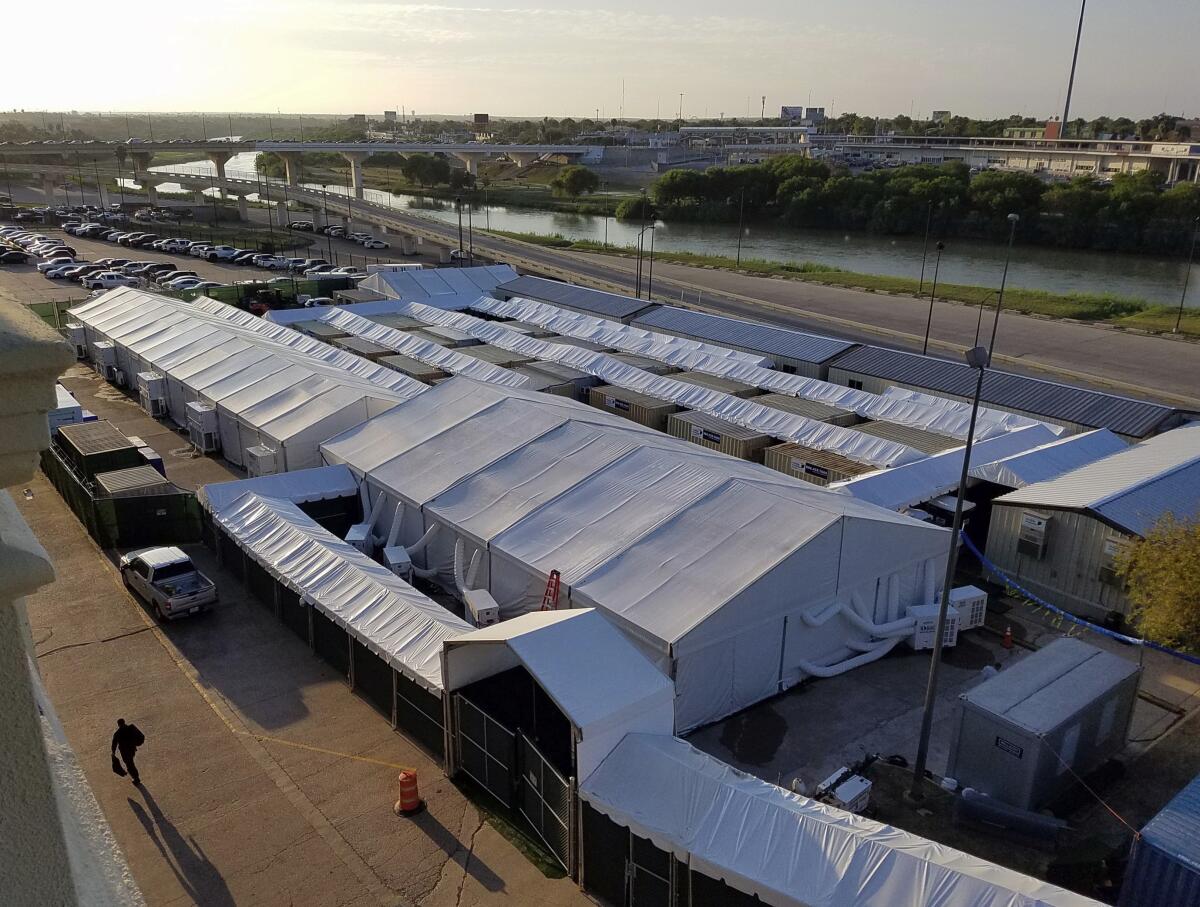Trump administration bars access to immigration tent courts

- Share via
HOUSTON — The Trump administration announced Wednesday that new immigration courts in tents on the Texas border with Mexico will be closed to legal observers, the press and the public.
Immigration lawyers condemned the restrictions as a violation of the due process rights of asylum seekers.
Federal contractors built the two massive tents along the Rio Grande in the cities of Brownsville and Laredo this summer at a cost of$25 million.
The “port courts” were designed to host hearings for the more than 42,000 asylum seekers who were returned to Mexico while their cases proceed under the Trump administration’s Remain in Mexico program that began in January, said Mark Morgan, acting commissioner of Customs and Border Protection.
Immigration judges in San Antonio will hear those cases over a video link, according to a statement from the Department of Homeland Security. Members of the public, including reporters and legal observers, will be permitted to watch the proceedings over video from the San Antonio court.
Immigration lawyers said they were told judges from the Texas cities of Harlingen and Port Isabel would also be hearing cases from the tent courts.
The Laredo court heard a few cases Wednesday and is expected to ramp up operations on Monday, with remote judges hearing 200 to 250 cases a day from 20 courtrooms, said Rep. Henry Cuellar, a Democrat who represents the city and organized a tour of the tent there Tuesday.
The Brownsville tent can host 720 migrants a day, according to a federal contract.
Lawyers said they were still trying to get more information about the proceedings and accused the government of making it difficult for them to represent asylum seekers.
“Without providing the correct locations, names of the immigration judges and the times of the hearings to the public, this administration is effectively violating its own regulations and blocking public access to immigration court hearings,” said Laura Lynch, senior policy counsel for the American Immigration Lawyers Assn.
Kennji Kizuka, a senior researcher at the advocacy group Human Rights First, said, “The Trump administration is hiding information about the human rights abuses asylum seekers are suffering after being forced to return to Mexico.
“It is just another attempt to cover up the flaws in this sham asylum process, a process created to block refugees from finding safety in the United States,” he said.
Leidy Perez-Davis, policy counsel for the American Immigration Lawyers Assn., which represents migrants scheduled to appear in the tent courts this month, said the new rules were a violation of the “due process rights owed to these asylum seekers.”
“Not allowing the public or the media into these proceedings will further erode due process as it will keep them secretive, especially for the majority of the people subject to Remain in Mexico who are unrepresented by counsel,” she said.
The federal government acknowledged that immigration courts are typically open to the public, which has had access to courtrooms in detention centers overseen by judges who appear via video. Immigration lawyers and reporters have been observing Remain in Mexico hearings at immigration court buildings in El Paso and San Diego for months.
But in its statement, Homeland Security said the new facilities are “unique from other immigration courts.”
“Given the law enforcement sensitive priorities of [ports of entry] — including traveler inspections, anti-terrorism efforts, interdicting narcotics/contraband, and apprehending law violators — these facilities will not be open to in-person public access, including media access,” the statement said.
More to Read
Sign up for Essential California
The most important California stories and recommendations in your inbox every morning.
You may occasionally receive promotional content from the Los Angeles Times.














